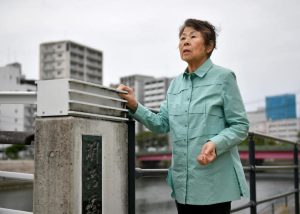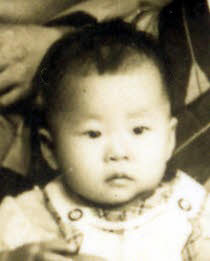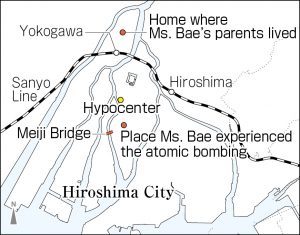Survivors’ Stories: Bae Soja, 83, Minami Ward, Hiroshima City – Forever yearning for lost father
Nov. 14, 2023
Continued suffering from prejudice and discrimination “as a Korean”
by Kana Kobayashi, Staff Writer
Among A-bomb survivors in Hiroshima, there are many whose homeland was the Korean Peninsula. At that time, Japan colonized and ruled the Korean Peninsula. Koreans came from across the sea to Hiroshima to work and live or were conscripted or drafted into the military. Bae Soja, 83, was among those who came.
On August 6, 1945, Ms. Bae, who was then four years old, was at her home with her mother and sister in Kokutaiji-cho (now part of Hiroshima’s Naka Ward) about one kilometer from the hypocenter. As if simultaneously, a flash of light, then she was struck by a violent blast and blown away.
With her mother and sister, she escaped to Misasa Hon-machi (now part of Nishi Ward), where her mother’s parents lived. She does not remember much from that time, except for the memory of crossing the Meiji Bridge (now part of Naka Ward) over the Motoyasu River, perhaps because she was in such a state of shock. “The soles of my feet were hot.” It is a memory seared into her body.
To support their household in those days, her father Byeonggu ran a pharmaceutical company with his older brothers in the city center close to the hypocenter. It seems they delivered their products to former army units. On the morning of that day, her father went to work as usual. It is believed he died at his workplace. His remains, however, have never been found.
All that remains are some photos taken during his lifetime. One of them is a family photo, in which Byeonggu showed a dignified expression next to young Soja and his wife. “Byeonggu was a kind and gentle man.” Ms. Bae has treasured this photo along with stories she heard from her mother.
After Japan’s defeat, the Korean Peninsula was liberated from colonial rule. Some of her relatives returned to their homeland. However, Ms. Bae remained in Hiroshima with her mother and young sister, where she had lived with her father.
Among those Koreans who remained in Japan, there were some who obtained Japanese nationality and others who obtained South Koreans nationality after the division of the Korean Peninsula. Ms. Bae chose South Korean nationality. “My father died as a Korean. I cannot change my nationality.” She has never lost her affection for her father.
Ms. Bae’s first name “Soja” is read and pronounced as “Akiko” in Japanese. Koreans were forced to change their names to Japanese names. She says, “I can be more myself when I use my real name. But I use my Japanese name to survive in this society.” To protect herself from discrimination against people from the Korean Peninsula, she has continued to use her Japanese name even after all these years since Japan’s defeat in the war.
Why am I a Korean even though I live in Japan? While she was young, she was greatly troubled by her roots. Over time, she came to terms with her situation. However, she never feels completely free from prejudice and discrimination that remain deeply rooted in Japanese society.
Why do Japanese people hate it when I say, “I’m a Korean.” Ms. Bae questions the atmosphere that prevails in society even today. She says, “If I had been from a Western country, I would have never felt like this.”
Seventy-eight years have passed since she lost her father to the atomic bombing. War still continues in the world today. Her heart aches to hear about Russia’s invasion of Ukraine and the Israeli military’s brutal attacks on autonomous Palestinian areas.
She says firmly, “Humans have advanced science and technology and are supposed to have become smarter over time. Nevertheless, humans are still doing the same things they have always done.” Then, she added, “We must not wage war. To that end, we must look back at the dark history of the past.”
(Originally published on November 14, 2023)










